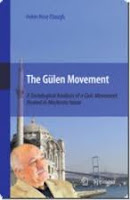Emre Oğuz
American sociology professor Helen Rose Ebaugh, who has written a book analyzing the Gülen movement, has said those criticizing the movement have no documents to back up their criticisms.
Ebaugh, the author of a book titled “The Gülen Movement: A Sociological Analysis of a Civic Movement Rooted in Moderate Islam,” was speaking at a conference organized by the Copenhagen-based Dialog Forum Foundation over the weekend. Stating that she received letters from some circles harshly criticizing Fethullah Gülen and the movement inspired by him after she began her research, Ebaugh said that when she called on them to prove their accusations they had failed to do so. She says they did not send her anything supporting their claims because such evidence does not exist.
Gülen is a Turkish Islamic scholar well known for his teachings promoting mutual understanding and tolerance between cultures.
Responding to questions by the participants at the conference, which was dominated by academics, the professor also provided information about her book. Noting that Americans knew little about Islam before the terrorist attacks on the World Trade Center on Sept. 11, 2001, she said radical Muslims immediately began appearing in the media after the attacks. Ebaugh, who still gives lectures on the sociology of religion at the University of Houston, said Gülen showed the other face of Islam when he condemned terror with statements he made at the time. Noting that like many other Americans, that was the first time she heard Gülen’s name, and she said she had an opportunity to examine the Gülen movement after she began her research. Recalling that Gülen stood trial in a court case for many years in Turkey, she said, however, the courts found no evidence of wrongdoing.
In 2000, then-State Security Court (DGM) prosecutor Nuh Mete Yüksel launched a case against Gülen on charges of establishing an illegal organization. At the end of the eight-year case, he was acquitted. Upon appeal, the General Criminal Chamber of the Supreme Court of Appeals upheld the acquittal.
Ebaugh underlined that the biggest contribution by the Gülen movement is the schools opened by the movement around the world. Noting that she met with several principals of these schools both in Turkey and the US, she said the young people who received an education at these schools are now serving at other such institutions across the world. She added that in time they will carry the thoughts of Gülen to more people.
The professor also commented on recent remarks by Gülen calling on the Turkish people to vote “yes” in the upcoming Sept. 12 referendum in Turkey, when the nation will vote on a constitutional amendment package. Stating that she was first surprised to hear that he made a special statement on the issue, as Gülen is not engaged in politics, she says when she understood how vital the changes were for Turkey, she acknowledged him to be right. Stating that the fact that Gülen made a special statement on the issue although he distances himself from politics shows how important the amendments are for the country, she added that it would be harder for the European Union to deny Turkey’s membership if the package is approved.
On Sept. 12, the nation will vote on a number of constitutional changes approved by Parliament in May. Among other things, the reform package includes changes to the structure of the Constitutional Court and the Supreme Board of Judges and Prosecutors (HSYK). Furthermore, the package repeals Article 15 of the Turkish Constitution, which gives immunity to the generals responsible for the Sept. 12, 1980 coup.
Published on Today's Zaman, 17 August 2010, Tuesday
Related Article:
American professor says criticism against Fethullah Gülen ideological


